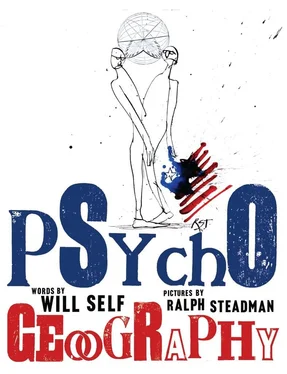The day was clouding over, and it impinged on me, looking up at the umpteen storeys of the block — its cut-and-shut architecture, reminiscent of a Loire chateau that has been customised into a stretch limo — that in Manhattan’s very elevation lay its decline. Only the gods lease office space on Olympus; yet here, on the twentieth, thirtieth, fortieth floor, a man picks his teeth with a paperclip, a woman adjusts her bra strap. Mars and Venus send out for pastrami on rye.
I was weary — so was Chip. As I suspected, he’d developed a blister. He left us at the first subway station, limping off through the afternoon crowds, his book bag bumping on his shoulder. Casey and I kept on, and the snapper, who’d spent the whole day circling around me on his mountain bike, as if I were visual carrion, now took on the role of my Virgil, leading me into the next circle of urban hell. We paused to examine a fanciful Chinese grotto — dinky greenery water plashing into teensy pools, the whole wreathed in dry-ice vapour, that was for sale on stall. Casey told me that there are forty thousand registered professional photographers in Manhattan. You can make of that what you will.
It was foolish of me to imagine that I could heal anything with my feet; after all this wasn’t a demonstration. Besides, I can’t stand marches: mass walking seems such a singularly inappropriate way of promoting peace and understanding. We went on the first of the big anti-war marches in London, in the autumn of 2002, and found ourselves trapped on the Embankment behind a claque of Muslim Association of Britain zealots, all of them screaming ‘Death to Israel!’ Too much death in the air already — we thought, too much hatred. The children were repelled — so were we. We hung on for a while then turned tail and marched back across Waterloo Bridge to Chez Gerard, where we demonstrated our opposition to all conflict by eating steak and escargots.
It was an equally dumb idea to walk to New York. Wending my way through Little Italy, looking at the Christmas decorations strung from those oblique black fire escapes, I was conscious only of the heavy straps of sore muscle, stretched and then bunched at the backs of my calves. I could feel the sweaty pads of my socks scrunching into the toes of my boots. It had worked, though, walking to New York. It had done exactly what I wanted it to do: the Atlantic had been siphoned off, the continental shelf jacked up, and Hayes, Middlesex, had been rammed unceremoniously into South Ozone Park.
That I had walked, continuously, from Stockwell in south London to Rivington Street in the Lower East Side of Manhattan, could not be denied — for my body told me that this was so; that it had covered some thirty-five miles over the past two days. And the body’s awareness is so much more plangent than that of any mere mind. Bodies like mine have been walking distances like these for hundreds — Yea! thousands — of millennia; what can a few score years of powered rolling and whistling flight mean set beside this immemorial trudge?
My hotel stood opposite the Economy Candy Store (since 1937). I said farewell to Casey and entered. Two floors up, in Reception, functionaries in black Mao tunics caressed their keyboards, while behind them a flat-screen monitor displayed an immaculate counterpane being disarranged by invisible hands. When the database maiden asked me if I’d had a good trip, I resisted the impulse to tell her I’d walked there from London. I’ve done this before, in similar circumstances, and the truth is: it gets you nowhere.
Another six storeys up and there it was: the floor-to-ceiling windows faced directly north, over the low rise of Greenwich Village to Midtown. The Chrysler Building and the Empire State, silver and gold urban jewellery, glinted in the late afternoon sun, which, purely to welcome me, had made a last, fleeting appearance. In the bathroom the freestanding sarcophagus of the bathtub sneered at me. I twisted the faucet and water, ridiculously, streamed from a hole in the ceiling. How I loathe hotels, establishments that try to convince you both that domesticity can be hired and that shitting is an ‘occasion’.
Two days later I was upstate. It was breakfast time, and I sat eating croissants with my brother and sister-in-law at their house in Amenia Union. Their new kitten, Tyco, scratched at his twine-coiled post, while through the austere twenty-four-pane windows I looked out over a bend in the road and the desiccated withies of New England’s century-old reforestation.
Since the walk to New York had ended, it was as if it had never been. Or rather, when, after a further day of tramping around Manhattan, I gave up and hailed a cab at St Mark’s Place to take me uptown, the walk was instantly turned sepia by the smirch of exhaust. It had happened in another era and I was back from the Renaissance. Since then there had been further cabs, and subways and trains and cars, all of them driving me further and further away from whatever point it had been that I was trying to make.
True, I had come to New York, I had done my business, and the following morning I would be flying home again. Yet the existence of the seven-thousand-odd-mile-wide territory that my feet had shaped into being didn’t make me, personally, feel any less cut off from the main. In my recollection, the London leg of the walk was a sunny upland, with the riverine city snuggled between wooded hills. By contrast, New York was all dun ground, grey skies and the charcoal strokes of leafless trees. Any sense of the topography was eroded by the human presence: the weight of their termite heaps, the pyroclastic floes of their automobiles, the nematode boring of their subsurface trains. In Oedipal terms this was all vastly unfair: hadn’t it been Mother who mopped my fevered brow, made of illness a cosy discourse, fed me, watered me? While Dad, what did he do save take me for the occasional long walk?
Talking to my brother, I asked why exactly it was that he’d assumed I’d be walking from JFK through Queens to Manhattan.
‘Oh, because Mother grew up there, of course. I thought you realised.’
‘She always told me she grew up on Long Island, although, come to think of it, I never asked her where.’
Nick explained this discrepancy by pointing out that a Jewish girl, growing up in interwar Queens, but already with one foot on the first rung of the ladder up and out, might well choose to gloss her origins thus. To me, who had reached my majority in the north London suburbs, such posturing still seemed counterintuitive. All my own childhood I had wanted to get in there, if necessary to entomb myself in Charing Cross itself. Surely to be urban was always to be cool? Surely it was better to be within the Five Boroughs — and hence a bone fide Noo Yawker — than out in the sticks. Nick said: not so.
Then he admitted that while he knew Mother had grown up in Kew Gardens, near Forest Hills, he didn’t know precisely where — he’d certainly never visited the apartment or house. And while I had felt certain, on reviewing this omission in my own geography, that her failure to tell me was a product of the fact that we were never in New York together, Nick said that she hadn’t volunteered this information to him either.
There it was, the reason why the walk had seemed so limp, so inconclusive. I had missed my ambulatory connection, why, within an hour of leaving the Crowne-Plaza at Baisley Pond Park, I could’ve been standing outside my mother’s natal home; if, that is, I had known its location.
It was then that my brother switched into one of his most efficient modes: that of professional researcher. Within minutes he had established which directory might furnish me with the address, and where it could be found. A few minutes more and he’d found out which train I should catch back into the city. A scant half-hour later, I was waving goodbye to him as the Metro-North train pulled out of Brewster. Like the Trinidadian girl at JFK, my brother understood the notion of a quest perfectly well.
Читать дальше












